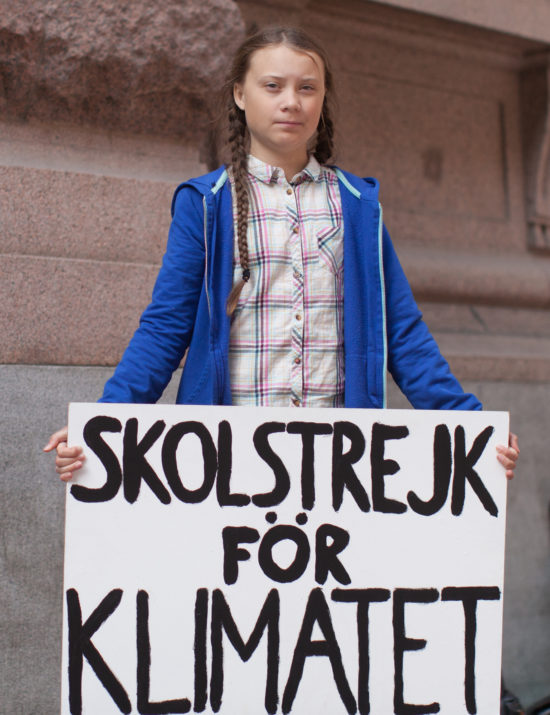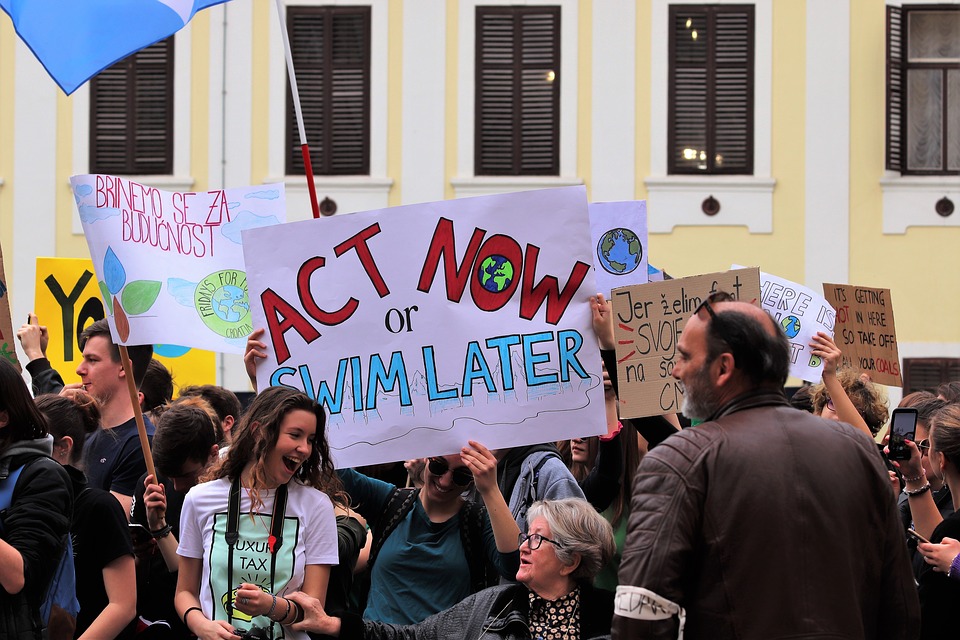Why should I be studying for a future that soon may be no more, when no one is doing anything to save that future? And what is the point of learning facts when the most important facts clearly mean nothing to our society? – Greta Thunberg
For months, pupils and students from all over the world have joined the activist Greta Thunberg in school, striking every Friday with clear demands from the political establishment: a climate policy which will prevent us from an irreversible climate catastrophe if no radical action is taken within the next 11 years. In the following, I would like to analyze some parts of Greta Thunberg’s speech „We live in a strange world …“ which she presented at the Goldene Kamera event in Berlin. Furthermore, a special focus will be laid on her use of language.
Greta Thunberg is a 16 year old activist from Sweden who first started to school strike in front of the Swedish parliament in August 2018. With a simple, yet precise slogan „Skolstrejk för klimatet“ she tries to raise awareness for the ongoing destruction of our planet and calls politicians and society to take action — every Friday.
The importance of the English language for Fridays for Future
Even though Greta takes her poster with the Swedish slogan „Skolstrejk för Klimatet“ to every place she goes, she does not hold her speeches in her mother tongue. Instead, she gives interviews and talks in English whenever she is abroad. There are various reasons for her choice to speak in a foreign language, of course. With the ongoing digitization and globalization of our current time, English has emerged as an essential language for people from different countries to communicate with each other. When it comes to communication on an international level, it is almost an unwritten rule to choose English over most other languages.
The majority of the pupils at the „Fridays for Future“ demonstrations are very young but still manage to understand Greta’s speeches. Greta herself is able to speak English on a level which is hard to distinguish from that of a native speaker. This stems from educational systems that encourage children to learn English as a second language from a very young age. Apart from education, the dominant language of the internet and press is also English. Even if the content of a website is not originally published in English, there is often the possibility to translate it into it. Most newspapers and books available are written in English and more importantly, it is easy to have access to them in different parts of the world. Thinking about the importance of the English language nowadays, it becomes self-evident why Greta chooses to speak it over her mother tongue. Using English, she is able to reach a wide audience, not only physically at her demonstrations but also on different internet platforms and the international press. As Fridays for Future is a movement with a unifying objective across borders, it also requires a communication tool which underlines its internationality.
Furthermore, when we think about language as a construct, there are three main fields which come to our minds immediately: first of all grammar (how does language function?), then semantics (how do words create meanings?) but also rhetoric (how and why do people use language?). In the context of Fridays for Future, the dimension of rhetorics is of special importance. In her speech at the Goldene Kamera, Greta aims to raise awareness about the climate crisis and thus wants to influence the audience with her choice of words. As English is taught in numerous countries around the globe, it helps to accomplish her objective of awareness raising more effectively. By implementing a variety of rhetorical figures, she wants to persuade the listeners to join the movement and recognize the climate change for what it is: a crisis. Moreover, she intends to transform persuasion into action. This is also the reason why she directly addresses the film stars at the Goldene Kamera by saying: „People see you celebrities as Gods. You influence billions of people. We need you“. This personal appeal implies that the addressees also bear the responsibility to fight against climate change. Greta further emphasizes a collective responsibility by starting most of her sentences with “ we“, hereby including everyone into the movement. However, the most striking aspect in her speech is that she starts various sentences with the anaphora „We live in a strange world“. With these words, she powerfully shows the absurdity of how little attention and importance is accorded to a crisis which will threaten the existence of humankind. But now, let us have a look at what she says on the content level.

We live in a strange world…
In her speech at the Goldene Kamera, Greta says: „Where the people who have contributed the least to this crisis are the ones who are going to be affected the most“. In the so-called global south, the carbon-dioxide emissions are insignificant if compared to those of major industrial nations, including the U.S.A., the U.K, China and Germany. A new study revealed that 7 out of 10 companies which produced the highest carbon-dioxide emissions in the E.U. in 2018 are in Germany. Additionally, Germany has one of the highest concentrations of coal-fired power stations in the world but still refuses to take immediate action towards a future with renewable energies. Instead, politicians opt for compromises which will not be sufficient to protect our environment sustainably. As Greta emphasizes, one of the severe consequences of this human-induced crisis is that it will hit the poorest people of the world, those who cannot afford to protect themselves. So one can say that climate change should also be regarded in the light of privilege and class politics, where the rich can afford protection while the poor will suffer due to a lack of capital. The majority of people in the so-called developing countries are highly dependent on agriculture to ensure a living. With changing weather patterns, shifting seasons and natural catastrophes they will be faced with famines, displacement and growing poverty.
Greta continues and says that „where everyone can choose their own reality and buy their own truth“. Almost on a daily basis, Trump, one of the world’s leading climate change deniers, tries to discredit the united scientific evidence of global warming by saying that it is a fiction. He does not recognize the existential threat that climate change poses to humankind but rather calls it the “ greatest hoax“ ever produced. However, his ignorance concerning this topic does not only remain on the verbal level. In accordance with his „America First policy“, he declared in June 2017 the United States‘ withdrawal from the Paris Agreement on Climate Change by 2020. He defended his decision by saying that the agreement imposed “draconian financial and economic burdens (…) on our country”. Yet all countries are able to choose individually to what extent they want to contribute towards a green future. As a result, the United States is soon going to be the only member of the UNFCCC not complying with the policies of the Paris Agreement.
Apart from criticizing current political measures, Greta also gives a hint as to what is needed in order to prevent a climate catastrophe. She states: „We live in a strange world where no one dares to look beyond our current political systems even though it’s clear that the answers we seek will not be found within the politics of today“. When I studied Economics, my professor entered the lecture and announced: „We only care about maximizing profits here. We don’t care about the employees. We don’t care about society or the environment. We look at our numbers and see how we can raise them“. I was shocked by the boldness of his words. However, his attitude mirrors our political and economic systems. Currently, the world’s 100 biggest companies are responsible for about 71% of all greenhouse gas emissions. The desire to maximize huge profits for the few is causing massive suffering for the many. Even though it is required, a simple carbon tax will not be sufficient to prevent the collapse of an ecosystem. Instead, large-scale investments in the welfare system need to be implemented and big corporations held accountable for their self-interest. The popular slogan „system change, not climate change“ implies that within an uncontrolled capitalist system which cares about profitability rather than sustainability, the crisis will continue.

In spite of the dark news and carbon-dioxide numbers we hear about everyday, it is important to remember that there are people and movements fighting for the protection of our environment and a future of transnational solidarity. In the United States, Alexandria Ocasio-Cortez who is a member of the U.S. House of Representatives is trying to push the policy of a „Green New Deal“. Her plan not only focuses on the elimination of carbon emissions caused by fossil fuels by extending the use of renewable energies, but also encompasses a radical shift of social policies such as free housing, medical healthcare and higher education for all people, not only for the top 1%.
Another example of course is the current movement led by young pupils and students, Fridays for Future in all around the world. This movement has been able to politicize an entire generation and raise awareness about one of the biggest threats humanity has ever faced. Besides, it demonstrates how important it is to take collective action against injustices. History has shown us that any progressive shift has been achieved through collective power only. As Greta puts it:
We live in a strange world.
But it’s the world that my generation has been handed. It’s the only world we’ve got.
We are now standing at a crossroads in history.
We are failing but we have not yet failed.
We can still fix this.
It’s up to us.
You can watch Greta’s whole speech here: https://www.youtube.com/watch?v=peCe2gFlD4s


